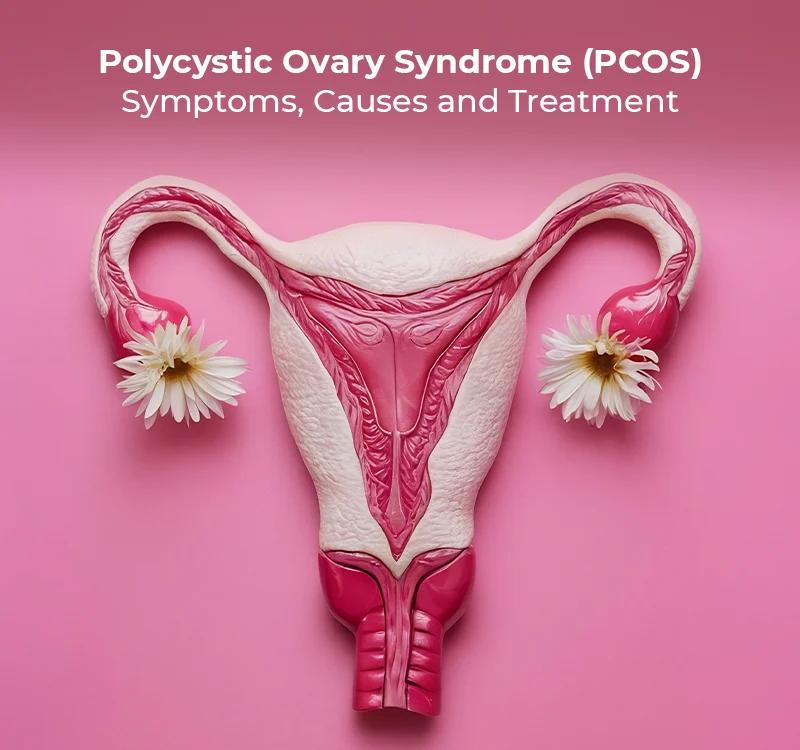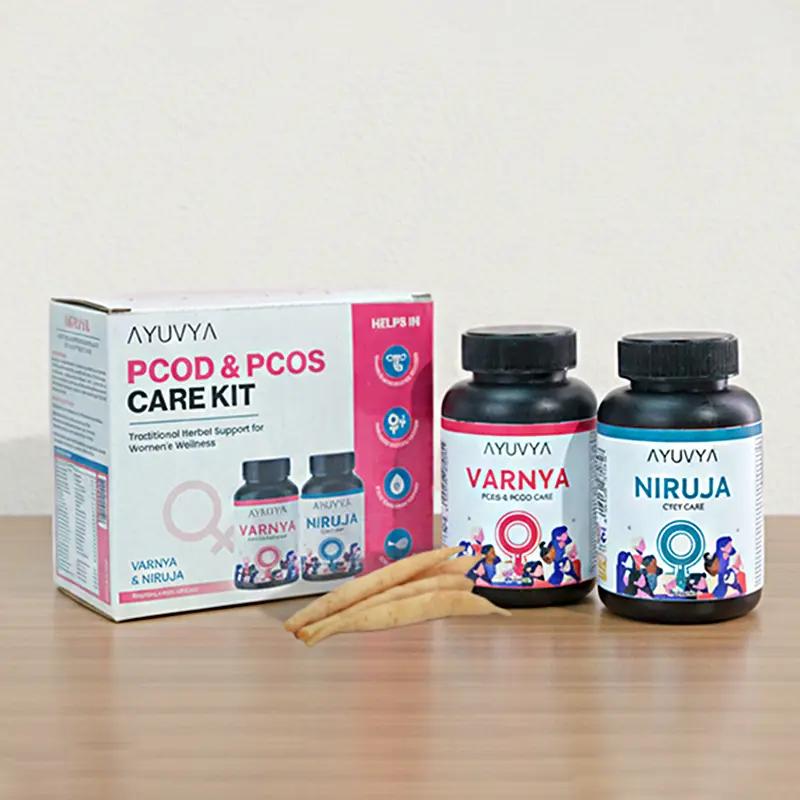Polycystic Ovary Syndrome (PCOS): Symptoms, Causes And Treatment
Apr 22, 2024

Polycystic Ovary Syndrome (PCOS) is a hormonal disorder that hampers the natural balance of reproductive hormones, leading to various symptoms, with irregular menstruation being one of the most common. In this article, we will understand all about PCOS and its effects on menstrual cycle:
Table of Contents:
- How does PCOD Affect the Menstrual Cycle?
- 5 Worst Impact of PCOS on Menstrual Cycle
- What are the Reasons Behind PCOS and Irregular Periods?
- How to Maintain Menstrual Cycle and PCOS with Ayurveda?
- Conclusion
- FAQs
How does PCOD Affect the Menstrual Cycle?
In order to understand the PCOD problem in females, one should know first about the menstrual cycle. The menstrual cycle is a hormonal symphony, where every hormone has a critical role in its control. Among the hormones involved in the menstrual cycle, estrogen and progesterone play particularly crucial roles, which are given below:
Estrogen
The ovaries are the main source of estrogen, which is responsible for the growth and thickening of the uterine lining (endometrium) in the first half of the menstrual cycle.
In addition, it controls the formation of female secondary sexual characteristics like breasts and wider hips.
Estrogen regulates the amount of luteinizing hormone (LH) and follicle-stimulating hormone (FSH) released from the pituitary gland, which controls the maturation of eggs in the ovaries.
Progesterone
The corpus luteum is the site of synthesis of progesterone, a temporary structure that develops in the ovary after ovulation.
Its main task in the menstrual cycle is to make the endometrium ready for the potential implantation of the fertilized egg, which would cause pregnancy.
Progesterone also sustains uterine lining thickness during pregnancy. In case of negative pregnancy, the levels of progesterone are reduced and the shedding of the uterine lining takes place called menstruation.
As a pair, estrogen and progesterone control the rhythm of the menstrual cycle, providing the preparation and shedding of the uterine lining.
5 Worst Impact of PCOS on Menstrual Cycle
1. Irregular Ovulation
In PCOS, the ovaries frequently do not release eggs on time as a result of hormonal imbalance. This interrupts the usual menstrual cycle, leading to irregular or missed periods.
PCOS is associated with excessive androgens (male hormones) and usually insulin resistance. These hormonal imbalances lead to the synthesis of estrogen and progesterone, the hormones, which are responsible for the control of menstruation.
3. Effect on the Endometrial Lining
In PCOS, the hormonal imbalance can result in an inadequate development or shedding of the lining of the uterus, leading to heavy or long periods when menstruation occurs.
4. Irregular Periods
Oligomenorrhea is a condition of women suffering from PCOS and is characterized by irregular menstruation. They may have less than nine cycles in a year or have more than 35 days between cycles.
5. Amenorrhea
Amenorrhea, which is the absence of menstruation for several months or more, can be a result of PCOS in some instances.
What are the Reasons Behind PCOS and Irregular Periods?
PCOS is a hormonal disorder that results in irregular menstrual cycles. The underlying reasons for this are multifaceted:
1. Hormonal Imbalance
PCOS is characterized by an excessive production of androgens, which may hamper the maturation and release of eggs in the process of ovulation.
2. Disturbed Ovulation
In PCOS, cysts can develop on the ovaries and ovulation may not occur on a regular basis, which leads to a disturbed menstrual pattern.
3. Insulin Resistance
Most of the women with PCOS have insulin resistance, which can increase blood sugar levels, thus worsening hormonal imbalances and affecting regular menstrual.
4. Endometrial Changes
Irregular ovulation results in prolonged endometrium (the lining of the uterus) exposure to estrogen, which makes it thicker than usual. This may lead to prolonged or uncontrolled bleeding when the lining is finally cast off.
How to Maintain Menstrual Cycle and PCOS with Ayurveda?
Ayurveda, as a holistic system, is aimed at balancing the doshas (Vata, Pitta, Kapha) of the body and promoting general health.
1. Balancing Hormones
Ayurveda can also help in regulating the production of androgens and maintaining the balance of estrogen and progesterone, thus, normalizing the menstrual cycle.
2. Improving Metabolism
A lot of Ayurvedic practices, such as changes in diet and herbal supplements, are aimed at improving metabolism. This is especially helpful in controlling insulin resistance, a common problem in PCOS.
3. Detoxification
Panchakarma therapies such as Ayurveda can detoxify the body that can lead to hormonal imbalances. The process of detoxification can promote hormonal regulation.
4. Stress Reduction
Activities such as meditation, yoga, and pranayama (breathing control) can decrease stress, which is a known trigger of PCOS symptoms.
5. Lifestyle Changes
A well-balanced diet and sufficient sleep can immensely benefit menstrual health in PCOS.
Final words
Ayurveda provides holistic management of PCOS, and it aims at bringing balance to the body and mind. By integrating Ayurvedic principles into everyday life, including dietary adjustments, herbal treatments, and stress-relieving practices, people can promote hormonal balance and enhance menstrual regularity.
Frequently Asked Questions
Herbs such as Shatavari, Ashoka, and Turmeric are beneficial for PCOD as they help in hormonal balance, inflammation reduction, and reproductive health.
Indeed, Ayurvedic medicine can be utilized for PCOD treatment by hormone balancing, metabolism improvement, and addressing the root cause of the disease.
Untreated PCOD can result in more severe symptoms and higher risks of metabolic syndrome, infertility, and endometrial cancer.
If PCOD is not treated it becomes a grave health issue as it may result in long-term complications such as infertility, type 2 diabetes, and cardiovascular diseases.
Pregnancy is possible for women with PCOD, but it can be challenging because of irregular ovulation. Fertility can be improved by treatment and lifestyle changes.
PCOD results in irregular periods because of hormonal imbalances that interfere with ovulation, and thus the regularity of the menstrual cycle.
In females, PCOD is a disorder which influences their reproductive health, hormone balance, and metabolism resulting in signs such as irregular periods, weight gain, and acne.
PCOD disturbs the harmony of reproductive hormones, causing irregular ovulation and menstrual cycles, which often result in delayed, infrequent, or prolonged periods.
PCOD (Polycystic Ovarian Disease) is a hormonal disorder usually presents with multiple cysts in the ovary, and it leads to irregular menstrual cycles among other symptoms.
The menstrual cycle is a normal routine of nature that prepares the body of a woman for pregnancy every month. It is a process that is characterized by hormonal changes that control the ovulation and the sloughing off of the uterine lining.














